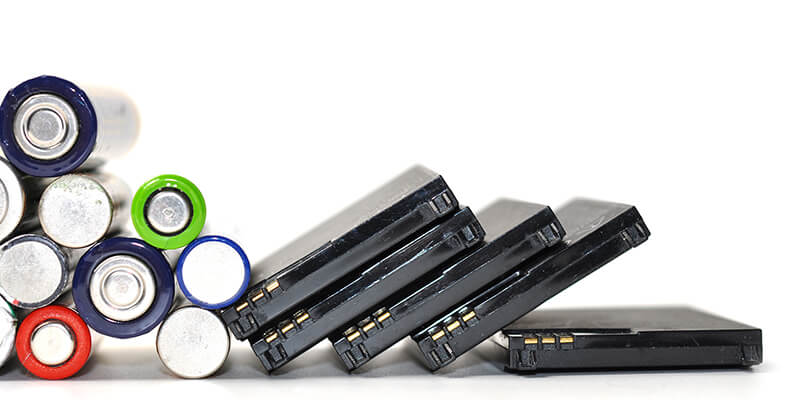Battery Disposal
- Batteries are not accepted in Rumpke’s waste and recycling program.
- Take them to a specialty recycler or participating retailer that accepts batteries for safe disposal.
Improperly discarded batteries can ignite devastating fires in our trucks, sorting facilities and landfills.

Find a Drop-Off Location
Never place batteries in your trash or recycling bins. Instead, tape the terminals and drop them off at a certified collection site. Use the helpful site locator below to find the safe drop-off location that’s closest to you!
Find a Drop-Off Location
Never place batteries in your trash or recycling bins. Instead, tape the terminals and drop them off at a certified collection site. Use the helpful site locator below to find the safe drop-off location that’s closest to you!
Should Batteries be Thrown in the Trash?

Lead Acid Batteries
Examples: vehicles, boats.
- Don’t place in the trash. Throwing them in the trash is prohibited.
- Lead acid batteries are the most heavily controlled batteries.
- Most auto stores will accept.

Lithium-ion Batteries
Examples: Phones, laptops, lawn equipment, greeting cards, power tools, electric vehicles, etc.
- Do not place these in the trash or curbside recycling.
- Must be sent back to the manufacturer or disposed of at a designated drop-off location.
- Lithium-ion batteries (Li-ion) are capable of holding a small residual charge. This lingering energy is dangerous if the battery is damaged.

Alkaline Batteries
Examples: AAA, AA, D-volt.
- Do not place in your waste or recycling.
- Take them to a designated battery collection center, such as Batteries Plus, visit The Battery Network, or contact your local solid waste management district for options.
- These batteries may contain heavy metals that can be harmful.
Should Batteries be Thrown in the Trash?
Stop! Don’t Toss That Battery! Here’s What to Do Instead
In this short video, Jeff Snyder, Director of Recycling at Rumpke, explains why proper battery disposal matters and how you can safely store and drop off used batteries while mitigating fire risks and environmental hazards.
Best Practices for Disposing of Batteries
- Visit Woodsy Owl's simple guide to turn your batteries in!
- Put old batteries in plastic bags or cover the ends of battery terminals with clear packing tape. This prevents lingering charges from releasing in the event of contact.
- Locate your nearest disposal site or look for battery drop-off events in your community. The Battery Network is another great resource that promotes battery recycling across the country.
- If you can’t remove the battery from an old device, bring the entire device to a facility recommended by your local solid waste management district for it to be properly disassembled. Batteries Plus offers many locations throughout the US.
- Check for battery returns. Some battery manufacturers accept returns via mail, but it’s important to follow postal shipping guidelines before putting old batteries in the mail.
Attention Rumpke Customers!
You should never put lithium-ion batteries in your bins or containers. It’s important to only recycle or dispose of items accepted in Rumpke’s program. Putting the wrong material into your bins and containers can put our workers and facilities at grave risk. Rumpke wants to make sure your recycling efforts count toward making a positive environmental impact for generations to come.
When in Doubt—Ask Us!
Contact us below or send us your recycling questions on social! Whether you're a beginner or expert recycler, we're here to help!
Battery Drop-off
Skip the bin! Turn your batteries in. Click below to find the safe drop-off location that’s closest to you!
Battery Drop-off



